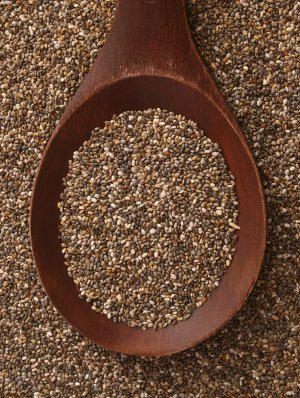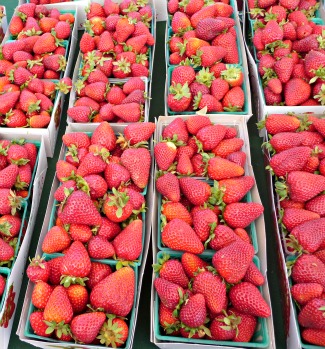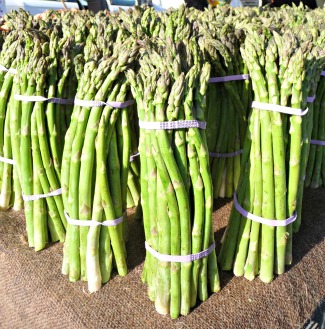| Back to Back Issues Page |
 |
|
Vibrant Living, Issue #140 Edible Wild Plants - Life Line Screening & Raw Recipes May 04, 2013 |
Greetings Health Seekers,Welcome to the VIBRANT LIVING NEWSLETTERWe’re just in the beginning of the spring season, but we have had very warm weather here in northern California. The fig trees are happy and so are the tomato plants soaking up all the liquid sunshine and enjoying the warm evenings. Each week there are new seasonal offerings at the farmers market, which provide that important element of variety and their unique nutrient profile that helps insure we do not become either deficient or overloaded in any one substance. I hope wherever you are in the world you are enjoying a wide variety of nature’s bounty, and loving relationships with family and friends. This edition of Vibrant Life contains an article written by Gretchen about the importance of the omega 3 to omega 6 ratio, the nutritional profile for several spring time foods, several new raw recipes, and the usual quotes from those who know best. Enjoy!
Fruit Juicing Recipes
First of all, what is the optimal amount and ratio of each of these essential fatty acids? It's important to establish this first before evaluating your current or any other diet. In 1999, the International Society for the Study of Fatty Acids and Lipids (ISSFAL) published its recommendations for Adequate Intakes (AI) of these two essential fatty acids. The AI's are recommended to be 1% of calories from omega 3, and 2-3% from omega 6. This means we're aiming for a ratio of omega 3 to omega 6 that is between 1:2 to 1:3. In a 2000 calorie diet, that translates to 2.2 g of omega 3, and between 4.4 and 6.7 grams of omega 6. However, this was the recommendation in 1999, and I notice that they have a later recommendation from 2004 of 0.7% omega 3 and 2% omega 6. The ratio is similar, but both the amounts have been lowered.
In light of all this, I personally aim for a minimum of 2 g of omega 3, and for 2-3 times that in omega 6, definitely not to exceed 4 times the omega 3. If my omega 6 is already higher than 8 grams, then I add a concentrated source of omega 3 to my diet in the form of chia or ground flax seeds. Other foods with a substantial amount of omega 3 are leafy greens, walnuts, and cherimoyas, and it's nice to include these in your diet as well. If you eat a very low fat raw vegan diet, you will probably find, as I have, that your ratio tends to be in the 1:1 to 1:2 range, and that you're getting enough omega 3 from your leafy greens and fruits to balance the omega 6 these foods also supply. Even if you add a very small amount of nuts and seeds, the fats will probably still be in balance. The best way to find out is to enter your day's intake into cronometer or a similar nutritional analysis tool. So during the times I go "overt-free," meaning not eating any nuts, seeds or avocado for a while, I don't supplement with flax or chia seeds. My fat intake during these phases is very low, but adequate and in my target ratio. However, as Dr. Greger said, vegan diets tend to have much more omega 6 than 3, even more skewed to the unhealthy side than omnivorous diets. It's easy to see why - most nuts and seeds have much more omega 6 than 3, so when I include these delicious and otherwise healthy foods in my diet more frequently, I also include a certain amount of flax or chia seeds to balance the fat they provide and keep my ratio in the 1:2 to 1:3 range. During these times, I'm eating slightly higher in fat, but I'm maintaining what I feel is a healthy ratio of omega 3:6. If you are eating cooked food, grains also contribute a surprisingly high amount of omega 6, even without adding any oil to your food. Thus a sprinkle of chia or flax seeds to your morning oatmeal will balance the omega 6 fat it supplies. What about the long chain omega 3 fatty acids, known as EPA and DHA? Do vegans need to worry about their levels of these fats? Most healthy bodies will convert the short-chain omega 3's from leafy greens, walnuts, flax and chia into these important long chain fatty acids, but there are times when the conversion process doesn't work as well as it should. A high intake of omega 6 competes for some of the same pathways, and prevents your body from manufacturing the ideal amounts of the long chain omega 3 fatty acids, even if you take in plenty of regular omega 3. This is one of the many reasons to keep your ratio of the two in the recommended window. If you know that you eat too much omega 6 on a regular basis and you haven't figured out how to eat a diet that is more balanced in fat, then you may want to consider supplementing with algae oil. Algae oil is a rich source of the long chain omega 3 fatty acids EPA and DHA. Algae is what fish eat to give them such a high ratio of these long chain omega 3 fats, and this is why many people take fish oil supplements. However, you can bypass the fish and consume the algae oil directly, which is preferable since it is a vegan source. However, I recommend working on your diet to bring your ratio of omega 3 to omega 6 into the 1:2 - 1:3 range as the best strategy. It may be important for more than just optimal conversion of short chain to long chain omega 3, and it seems preferable to me to get what I need in the way of fat from my food, not from supplements.
Springtime brings fresh strawberries to the markets with their deep red complexion and sweet tasting goodness, but they are also loaded with excellent nutrition. Like most foods, strawberries contain a wide range of nutrients, most notably vitamin C. They also contain significant levels of phytonutrients and antioxidants, and the flavonoids quercetin and kaempferol. The antioxidant properties are what make the strawberry bright red.
In addition to vitamin C, strawberries also provide an excellent source of vitamin K, vitamin B5, vitamin B6, folic acid, manganese, potassium, riboflavin, copper, magnesium, and omega-3 fatty acids. Strawberries are an interesting fruit as they have their seeds on the outside of the fruit and not on the inside like most fruits. They are very high in fiber, yet contain relatively few calories. Strawberries are known to be anti-inflammatory, anti-cancer, and promote overall good health.
Asparagus Another springtime favorite at the farmers market is fresh asparagus, also a nutrient rich food. Asparagus is high in vitamins A, C, E and K, folate, zinc, and chromium, which helps regulate blood sugar levels. It contains the flavonoids quercetin, rutin, laempferol and isorhamnetin, which all help to combat arthritis, asthma, and autoimmune diseases. These tasty green spears are particularly high in the master anti-oxidant glutathione, which is said to have a profound influence over everything from anti-aging to fighting all cancers. The amino acid asparagine, found in asparagus, is a diuretic and has been used to treat swelling, high blood pressure, arthritis, rheumatism, and PMS-related water retention. Asparagus does contain naturally-occurring substances called purines; when broken down by the body, purines form uric acid, which can lead to gout and the formation of kidney stones. People with kidney problems or gout should limit or avoid intake of purine-containing foods such as asparagus, but for most people moderate asparagus consumption during the season should not be an issue. As usual, balance and variety of diet will help a person avoid issues of over consumption. Oh, and that strong smell in your urine after asparagus consumption is not thought to be a negative issue. Even after loads of research the exact cause of the smell is not known, but there are no known negative health effects associated with it. Asparagus contains a multitude of natural chemicals, mainly methanethiols and sulfurs that are most likely responsible for the odor.
***************************************************************
Mild Detoxifier Juice
“You can set yourself up to be sick, or you can choose to stay well.” ~Wayne Dyer
Although I believe strongly in a diet comprised mostly of fresh raw foods, I do supplement with super green powders, nuts, seeds, sea vegetables, and the occasional dried fruit such as goji berries. If you’re like me you’re always looking for a good deal on quality food whether it’s fresh from the farmers market or purchased online, so I thought I would share with you where I make most of my online purchases. You may already be aware of the Raw Food World and their “at cost” specials, but if not here you go. When you go to purchase supportive foods like those listed above you can save money and get “at cost” special pricing by going to the link below and clicking on the “at cost” specials tab. This also allows you to save up to 14% on every order of their already good deals. The important thing to remember is that fresh is best and these products are supportive and should not be your mainstay. Enjoy! ************************************
There are a number of new testimonies at the website which I hope you will read and pass on to others when you feel they would benefit. And please feel free to leave your own story if you feel moved to do so. You need not be 100% raw to share a testimony; the fact is most people on the raw diet are not 100% anyway. Your story may inspire someone else, perhaps from the other side of the globe, to give the raw food diet a try.
Success stories.
Please send me your health questions, they can be submitted anonymously if you prefer, and you may help someone else improve their health and quality life.
Your questions.
Be Well and Wonderful, Hugh
*****************
hugh@raw-foods-diet-center.com MEDICAL DISCLAIMER The contents of my website and my newsletter are gleaned from my experiences and observations, meant only for educational purposes and not intended to replace medical advice, consultations, or treatment of any kind. I recommend you see your professional health care provider if you suspect you have an illness or disease of any kind. I'm not medically trained, and I would never suggest or imply that I know what is best for someone else's body or overall health, ultimately each of us is the only one who knows what's best for us. |
| Back to Back Issues Page |
 I watched a video presentation of Dr. Michael Greger from 2002 recently, where he talked about the two key areas of vegan diet and health that tend to be weak, and that he feels probably explain why vegans don't have a longer life expectancy than the general population. These are deficiency in B12, and too much omega 6 compared to omega 3. In the Lyon Heart Health Study, the Mediterranean style diet that outperformed the American Heart Association (AHA) Diet in reducing second cardiovascular events had a 1:4 ratio, whereas the AHA's diet had a much higher amount of omega 6.
I watched a video presentation of Dr. Michael Greger from 2002 recently, where he talked about the two key areas of vegan diet and health that tend to be weak, and that he feels probably explain why vegans don't have a longer life expectancy than the general population. These are deficiency in B12, and too much omega 6 compared to omega 3. In the Lyon Heart Health Study, the Mediterranean style diet that outperformed the American Heart Association (AHA) Diet in reducing second cardiovascular events had a 1:4 ratio, whereas the AHA's diet had a much higher amount of omega 6.

